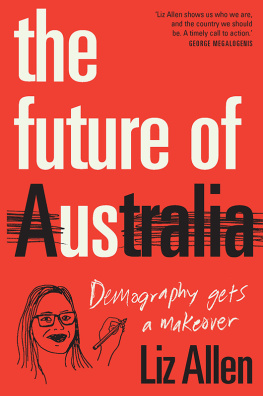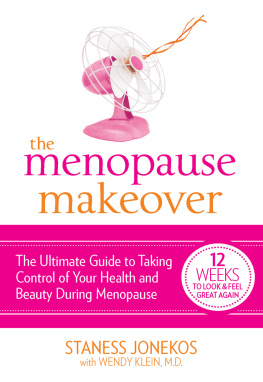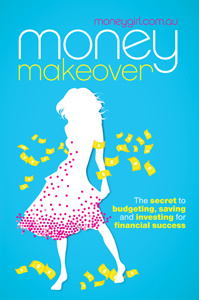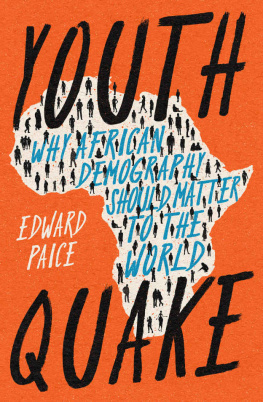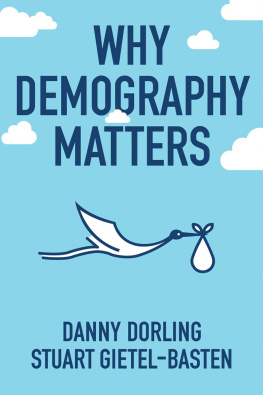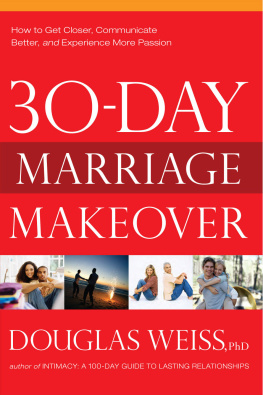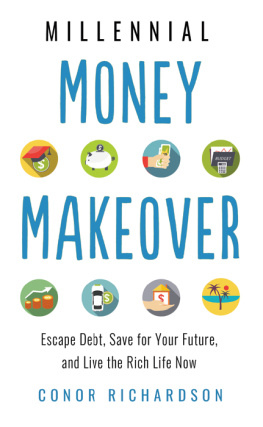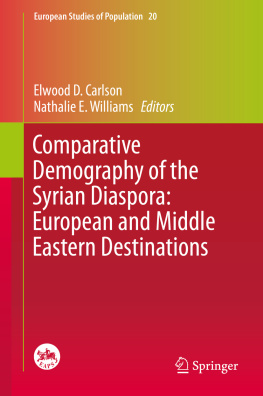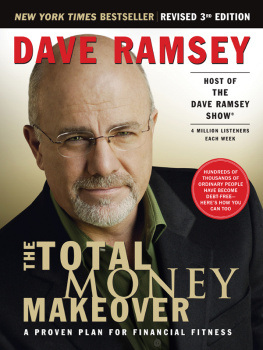Liz Allen - The Future of Us: Demography gets a makeover
Here you can read online Liz Allen - The Future of Us: Demography gets a makeover full text of the book (entire story) in english for free. Download pdf and epub, get meaning, cover and reviews about this ebook. year: 2020, publisher: NewSouth Publishing, genre: Politics. Description of the work, (preface) as well as reviews are available. Best literature library LitArk.com created for fans of good reading and offers a wide selection of genres:
Romance novel
Science fiction
Adventure
Detective
Science
History
Home and family
Prose
Art
Politics
Computer
Non-fiction
Religion
Business
Children
Humor
Choose a favorite category and find really read worthwhile books. Enjoy immersion in the world of imagination, feel the emotions of the characters or learn something new for yourself, make an fascinating discovery.
The Future of Us: Demography gets a makeover: summary, description and annotation
We offer to read an annotation, description, summary or preface (depends on what the author of the book "The Future of Us: Demography gets a makeover" wrote himself). If you haven't found the necessary information about the book — write in the comments, we will try to find it.
Liz Allen: author's other books
Who wrote The Future of Us: Demography gets a makeover? Find out the surname, the name of the author of the book and a list of all author's works by series.
The Future of Us: Demography gets a makeover — read online for free the complete book (whole text) full work
Below is the text of the book, divided by pages. System saving the place of the last page read, allows you to conveniently read the book "The Future of Us: Demography gets a makeover" online for free, without having to search again every time where you left off. Put a bookmark, and you can go to the page where you finished reading at any time.
Font size:
Interval:
Bookmark:

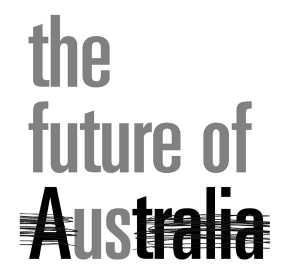
LIZ ALLEN is a demographer and social researcher, teaching research methods and researching population dynamics at the ANU Centre for Social Research and Methods. She uses her analytic skills to provide much-needed information about data (for example the census and marriage postal survey) or population dynamics (for example immigration and fertility).
Liz has written numerous pieces for The Conversation, scholarly articles in academic journals and contributions to research reports. She was named in the inaugural ABC Top 5 Humanities and Social Sciences academics in Australia 2018. She can be found on social media under the alter ego of Dr Demography.
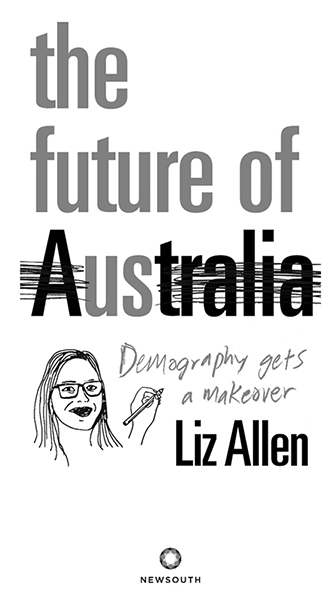
A NewSouth book
Published by
NewSouth Publishing
University of New South Wales Press Ltd
University of New South Wales
Sydney NSW 2052
AUSTRALIA
newsouthpublishing.com
Liz Allen 2020
First published 2020
This book is copyright. Apart from any fair dealing for the purpose of private study, research, criticism or review, as permitted under the Copyright Act, no part of this book may be reproduced by any process without written permission. Inquiries should be addressed to the publisher.

A catalogue record for this book is available from the National Library of Australia
ISBN 9781742236506 (paperback)
9781742244785 (ebook)
9781742249285 (ePDF)
Design Josephine Pajor-Markus
Cover design and illustration Design by Committee
All reasonable efforts were taken to obtain permission to use copyright material reproduced in this book, but in some cases copyright could not be traced. The author welcomes information in this regard.

Contents
INTRODUCTION
Beyond destiny
The future worries me. It keeps me awake at night. In Australia, as in much of the world, there are now more older people than ever before, and fewer younger people. The very core of who we are as a nation is undergoing major transformation, and exactly what might happen next is uncertain, as proportionally more Australians age out of the workforce and fewer young people fill the void. How will the competing demands and needs of the young versus older people be reconciled, especially when children dont have a say in the nations democratic processes? How are people of working age the nations economic lifeblood going to fare, when theyve been locked out of the housing market, and when increased pressure to balance family and work already has real consequences for their health and wellbeing? And how will government adequately provide for people in their old age if there arent enough workers contributing personal income tax to fund government coffers? I worry about the Australia my children will inherit but as a demographer, I also have hope.
Demography is destiny. Its a bold claim, one uttered a little too often without much consideration of what it means. Whats more, its not actually true. Demography is far more important than mere destiny its more like a superpower. By tracing connections between a populations past and present, demographers foresee its future. The true wonder of demography, though, is not its ability to predict the future but to shape it, by identifying the challenges that lie ahead and harnessing the opportunities. In that sense, demography goes beyond destiny.
The study of demography centres on population and the dynamics of change births, deaths and migration asking how and why these dynamics vary across time and place. At the individual level, our very existence can be understood as a result of broader social, cultural and economic forces that brought our parents together. These same forces shape the trajectory of our lives, translating the socioeconomic circumstances into which we are born into advantage and disadvantage access and opportunities, or a lack of them. Health, education, employment, home ownership and even voting behaviour are just some of the things that demography can help us to understand and explain.
Think of demography like a Choose Your Own Adventure for the nation the story of who we were, who we are now, and who we will be, as individuals, families and communities. We are where we are today because of the paths weve taken in the past, and now were confronted with a series of choices. Take me, for example. My life just like yours is a case study in demography. Statisticians could have anticipated much of its course based on my familys socioeconomic status and the events I experienced in childhood. But it wasnt all written in the stars or rather destined by the stats because in every Choose Your Own Adventure there are multiple paths, with each new fork leading off in a different direction.
I was born seventh of eight children. My mother trained as a teacher at the local convent, and my father worked in the court system, having entered the public service via an entry exam after high school. My parents were Catholics and followed the preaching of the pope and local priest almost to the letter. Their lives, and therefore my life, were shaped by the taboo against birth control and the desire, widespread among good Catholics, for a large family.
They married later than was usual for early-1970s Australia: Mum was 25 and Dad 32. Because they were older when they married, they had saved money and bought a little red-brick house in the same street as my fathers entire family the same street Dad was raised on. Mum and Dad had both been living at home until the day they married, Mum even sharing a room with her sister until a couple of years before. This was normal back then.
Mum was relatively young by todays standards when she had her first child almost a year after their wedding, but at just shy of 26 she was getting on for the time. Despite this late start, my parents went on to have their eight children over nearly ten years. Us kids were so closely spaced that my sisters and I were regularly mistaken for triplets. Mum was nearly 35 when she had me a circumstance unheard of at the time in our community in western Sydney and by the time I got to school, people mistook her for my grandmother.
I grew up on the inland plains of the Hawkesbury River, at the foot of the Blue Mountains. The landscape was beautiful, but the economic circumstances of the average family living there were pretty low. We literally lived on a flood plain, in an area where government housing was concentrated because the land was cheap. It was fertile land, though, good for farming. There was a big Maltese community, and lots of Maltese migrants worked in the agricultural industry, growing vegetables to feed the population of Sydney.
My family survived on a single income Mum had left her teaching job when she married my father, a very common thing for the early 1970s but my parents were savers, and the kitchen cupboards were always stocked like we were prepping for the end of the world. Rows of tinned corn, fish, soup, baked beans and spaghetti lined the pantry, alongside cereals and biscuits (not the sweet ones). Everything had its place in the pantry, and there was a steady rotation of use and replacement. There was always food. It wasnt fancy, but it was nourishing.
Next pageFont size:
Interval:
Bookmark:
Similar books «The Future of Us: Demography gets a makeover»
Look at similar books to The Future of Us: Demography gets a makeover. We have selected literature similar in name and meaning in the hope of providing readers with more options to find new, interesting, not yet read works.
Discussion, reviews of the book The Future of Us: Demography gets a makeover and just readers' own opinions. Leave your comments, write what you think about the work, its meaning or the main characters. Specify what exactly you liked and what you didn't like, and why you think so.

